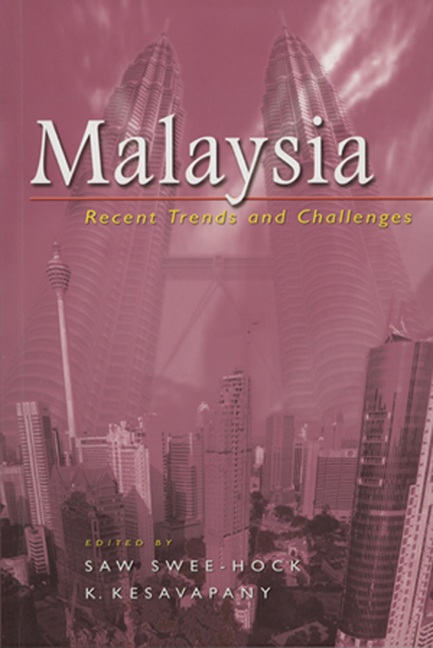Book contents
- Frontmatter
- Content
- Preface
- Foreword
- Contributors
- 1 Population Trends and Patterns in Multiracial Malaysia
- 2 The Emerging Politics of Islam Hadhari
- 3 Bangsa Malaysia: Vision or Spin?
- 4 The 2004 Malaysian General Elections: Economic Development, Electoral Trends, and the Decline of the Opposition
- 5 The UMNO-PAS Struggle: Analysis of PAS's Defeat in 2004
- 6 The Malay Electorate in 2004: Reversing the 1999 Result?
- 7 UMNO and BN in the 2004 Election: The Political Culture of Complex Identities
- 8 Malaysia's Civil Service Reform: Mahathir's Legacies and Abdullah's Challenges
- 9 Reinventing Governance in Corporate Malaysia: The Challenges Ahead
- 10 Globalisation and Ethnic Integration in Malaysian Education
- 11 Globalisation and the Challenges Facing Malaysia's Economy
- 12 Promising Start to Malaysia-Singapore Relations
- Bibliography
- Index
6 - The Malay Electorate in 2004: Reversing the 1999 Result?
Published online by Cambridge University Press: 21 October 2015
- Frontmatter
- Content
- Preface
- Foreword
- Contributors
- 1 Population Trends and Patterns in Multiracial Malaysia
- 2 The Emerging Politics of Islam Hadhari
- 3 Bangsa Malaysia: Vision or Spin?
- 4 The 2004 Malaysian General Elections: Economic Development, Electoral Trends, and the Decline of the Opposition
- 5 The UMNO-PAS Struggle: Analysis of PAS's Defeat in 2004
- 6 The Malay Electorate in 2004: Reversing the 1999 Result?
- 7 UMNO and BN in the 2004 Election: The Political Culture of Complex Identities
- 8 Malaysia's Civil Service Reform: Mahathir's Legacies and Abdullah's Challenges
- 9 Reinventing Governance in Corporate Malaysia: The Challenges Ahead
- 10 Globalisation and Ethnic Integration in Malaysian Education
- 11 Globalisation and the Challenges Facing Malaysia's Economy
- 12 Promising Start to Malaysia-Singapore Relations
- Bibliography
- Index
Summary
On 21 March the ruling National Front (Barisan Nasional, or BN) swept to its greatest electoral victory ever, winning 199 of 219 seats. The Opposition won only 20 seats, down from 45 in the smaller outgoing parliament. The Democratic Action Party (DAP) increased its representation by two to 12, but Parti Islam SeMalaysia (PAS) declined from 27 to six, and Parti keADILan Malaysia (Keadilan) retained only one of its five seats. Unexpectedly, the BN even routed PAS and coalition ally Keadilan in the Malay heartland states. In 1999, it won 11 of 40 parliamentary seats in the four northernmost states; this time it took 33, representing a swing in the popular vote ranging from 4 per cent in Kedah to 16 per cent in Terengganu (refer to Tables 6.1 and 6.2). It reversed the 1999 result for the Terengganu state assembly (28 to four), strengthened its hold on the Kedah and Perlis assemblies, and just fell short of PAS in Kelantan (24 to 21).
The conduct of the elections and the result were warmly welcomed by world leaders and the international media. A US official congratulated Malaysia “on the conduct of the election and how the process was handled … the decision was made by the people of Malaysia and we'se happy the election went well”. The Australian declared that Malaysian elections “are free and fair … and they are very good news for everybody who understands that democracy is the best antidote to the Islamic fundamentalism [meaning PAS] that fosters political terrorism”. The Christian Science Monitor went even further: “The sweeping victory of Malaysia's secular rulers … emphasises the narrow appeal of Muslim hard-liners in Southeast Asia, where strict religion-based politics run up against multiethnic realities. Muslim voters dealt a potentially knock-out blow to the conservative PAS.”
- Type
- Chapter
- Information
- MalaysiaRecent Trends and Challenges, pp. 132 - 156Publisher: ISEAS–Yusof Ishak InstitutePrint publication year: 2005

